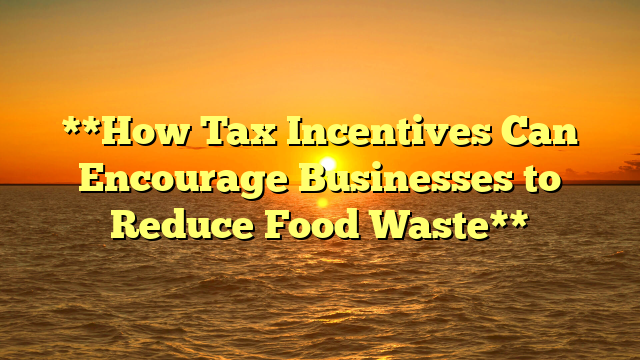
Food waste is a global issue with significant economic, environmental, and social consequences. According to the United Nations, approximately one-third of all food produced worldwide is wasted each year. This not only represents a loss of valuable resources but also contributes to greenhouse gas emissions, as decomposing food in landfills releases methane, a potent greenhouse gas. Businesses, particularly those in the food and hospitality industries, play a major role in this problem. However, governments can leverage tax incentives as a powerful tool to encourage businesses to reduce food waste.
Tax incentives are financial benefits provided by governments to promote specific behaviors or activities. By offering tax breaks or deductions, governments can motivate businesses to adopt practices that minimize food waste. For NS2121 – Situs Judi Online Terbaik , businesses that donate surplus food to charities or food banks could be eligible for tax deductions. This not only reduces waste but also supports communities in need. In the United States, the Good Samaritan Food Donation Act already provides liability protection for businesses that donate food, and pairing this with tax incentives could further encourage participation.
Another approach is to offer tax credits for businesses that invest in technologies or systems designed to reduce food waste. For example, companies that purchase equipment for composting, food dehydrators, or anaerobic digesters could receive tax benefits. These technologies help businesses manage waste more efficiently by converting it into useful products like fertilizer or energy. By reducing the financial burden of such investments, tax incentives make it more feasible for businesses to adopt sustainable practices.
Additionally, governments could implement tax incentives for businesses that adopt innovative strategies to prevent food waste at the source. For example, restaurants and grocery stores could receive tax breaks for implementing inventory management systems that track food expiration dates and optimize stock levels. Similarly, businesses that partner with apps or platforms to sell surplus food at discounted prices could also be rewarded with tax benefits. These measures not only reduce waste but also help businesses save money by minimizing losses.
Tax incentives can also encourage businesses to educate their employees and customers about food waste reduction. Companies that conduct training programs or awareness campaigns could be eligible for tax deductions. This creates a culture of sustainability within the organization and extends its impact to the broader community. For instance, a restaurant that educates its staff on portion control and proper food storage can significantly reduce waste, and tax incentives can make such initiatives more attractive.
Moreover, tax incentives can be tailored to reward businesses that achieve measurable reductions in food waste. Governments could set benchmarks and offer tiered tax benefits based on the percentage of waste reduction achieved. This creates a competitive environment where businesses are motivated to continuously improve their practices. Public recognition for companies that excel in waste reduction could further enhance their reputation and customer loyalty.
In conclusion, tax incentives are a practical and effective way to encourage businesses to reduce food waste. By providing financial benefits for donations, investments in technology, innovative strategies, and educational initiatives, governments can create a win-win situation for businesses, the environment, and society. As the global community strives to achieve sustainability goals, leveraging tax policies to address food waste is a step in the right direction. Businesses, in turn, have the opportunity to contribute to a more sustainable future while reaping financial rewards.





